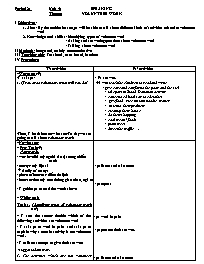Thiết kế bài dạy môn Tiếng Anh 11 - Period 21 - Unit 4: Speaking

I Objectives:
1. Aims: By the end the lesson, ps will be able to talk about different kinds of activities related to volunteer work
2. Knowledge and skills: - Identifying types of volunteer work
- Asking and answering questions about volunteer work
- Talking about volunteer work
II Methods: Integrated, mainly communicative
III Teaching aids: Text book, extra board, handout
IV Procedure:
Bạn đang xem tài liệu "Thiết kế bài dạy môn Tiếng Anh 11 - Period 21 - Unit 4: Speaking", để tải tài liệu gốc về máy bạn click vào nút DOWNLOAD ở trên
Period 21 Unit 4: SPEAKING Theme: VOLUNTEER WORK I Objectives: 1. Aims: By the end the lesson, ps will be able to talk about different kinds of activities related to volunteer work 2. Knowledge and skills: - Identifying types of volunteer work - Asking and answering questions about volunteer work - Talking about volunteer work II Methods: Integrated, mainly communicative III Teaching aids: Text book, extra board, handout IV Procedure: T’s activities Ps’ activities *Warm up (5’) -T asks ps : 1. If you are a volunteer, what will you do? -Then, T leads into new lesson: To day we are going to talk about volunteer work - Ps answer. à I will teach the children to read and write - give care and comfort to the poor and the sick - take part in Blood Donation activity - collect used books or used clothes - give food, rice, instant noodle, money - listen to their problem - clean up their house - do their shopping - cook meals/ foods - plant trees - direct the traffic. *New lesson: * Pre- Task(5’) New words: - war invalid (n): người tàn tật trong chiến tranh - martyr (n): liệt sĩ à family of martyr - place of interest: điểm du lịch - intersection (n): con đường giao nhau, ngã tư - T guides ps to read the words above * While- task Task 1: Identifying types of volunteer work (10’) * T sets the scene: decide which of the following activities are volunteer work - T asks ps to work in pairs and asks ps to explain why a certain activity is not volunteer work. - T calls on some ps to give their answers *suggested answer: 1. The activities which are not volunteer work: Taking part in an excursion and participating in an English speaking club. Reason: You take part in these activities for yourself, not to help other people. 2. Some other volunteer activities: taking part in environmental conservation activities, donating blood, directing traffic, guiding foreign sport teams around when they go to Vietnam to compete Task 2 :Asking and answering questions about volunteer work (20’) - Before ps doing the task, T asks them to read the model conversation on page 50 and then make similar conversation. * Model: A: What kind of volunteer work are you participating in (taking part in)? B: B: I am working in difficult and flooded areas. A: What exactly are you doing? B: I’m giving food, rice, instant noodle, canned food, used books and clothes.. A: Do you enjoy the work? B:I feel happy to help them overcome difficulty - Then ask ps to read the list of volunteer activities and the exact things related to them (T may require ps to match each activity on the left with corresponding activities on the right. - T goes around to check and offer help - Then, call on some pairs to perform their conversations in front of the class - T can model first if ps find them difficultly Task3: Talking about volunteer work (5’) - Ask ps to wok in groups: Talk about a kind of volunteer work your friend and you usually do to help people. - Before ps do the task may ask ps to read through the example in the book. T encourages ps to use transition signals such as: also, besides, moreover, etc. to make their talk more coherent. .- T goes around to observe and collect typical errors - Call on some ps to talk about the activity they take part in. - T gives final comments. - ps listen and take notes - ps repeat - ps work in pairs - ps present their answer. - ps listen and take notes - ps do the task in pairs. - ps practise their dialogue - ps listen and take notes * suggested answer: *Helping people in mountainous areas - Teaching the children to read and write - - Giving them money * helping old or sick people - Cleaning up their houses - - Doing their shopping – Cooking meals *helping disadvantaged or handicapped children - Teaching the children to read and write - - Listening to their problems– Playing games with them -Taking them to places of interest * Taking care of war invalids and the families of martyrs - Listening to their problems - Cleaning up their houses -Doing their shopping – Cooking meals * Taking part in directing the traffic. - Directing vehicles at the intersections. - Helping old people. & young children to cross the road - ps to wok in groups - ps read through the example in the book - ps take notes - ps present their talk * suggested answer: - Mai usually takes part in directing the traffic. She directs vehicles at the intersections. Besides that, she helps old people and young children to cross the road. She enjoys the work very much because she likes helping people. V. Homework: -T summarizes the main points and asks ps to prepare new lesson for the next time
Tài liệu đính kèm:
 unit 4 speak.doc
unit 4 speak.doc





